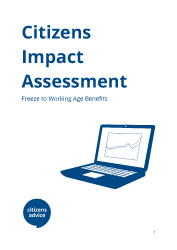Freeze to working age benefits - Citizens Impact Assessment
The Government has set out plans for a two-year uprating freeze on most working-age benefits. It is vital that policymakers fully understand the potential impact of this change.
Citizens Advice has been helping clients with the programme of welfare reform implemented over the last parliament. Our evidence therefore provides extensive insight into the challenges already presented, the issues affecting our clients now, and the likely impact of ongoing reform in the future.
- Benefits have been uprated below inflation since the start of 2013. This has placed significant financial pressure on millions of low income households. Over the last four years, there has been a sharp increase in Citizens Advice clients seeking advice on debt. The composition of debt is also changing, with a shift away from consumer credit issues towards problems in meeting basic household bills.
- The uprating freeze will therefore take effect at a point when many households are already financially vulnerable. A survey of 200 advisers at Citizens Advice found that two-thirds believed their clients were in a worse position to cope with the impacts of a freeze, in comparison to circumstances in 2012.
- With inflation projected to increase over the next two years, these risks should be considered against the savings intended; growth in problem debt entails very significant costs, both for those affected and the Exchequer, and affects work incentives, health outcomes and family life.
- The freeze will affect some of the most vulnerable in society. Of clients coming to Citizens Advice regarding benefits included in the freeze, nearly half are affected by a health condition or disability and over 40% have dependent children. These groups may also have fewer options to increase their incomes in the workplace.
- If the Government seeks to achieve its aims of cost savings, alongside protection of the vulnerable, it is vital that full consideration is given to meeting advice and support needs. In the case of an uprating freeze, this means reaching people early and providing help up-front; once people fall into debt, both addressing the problem and the costs it entails become much more difficult.


